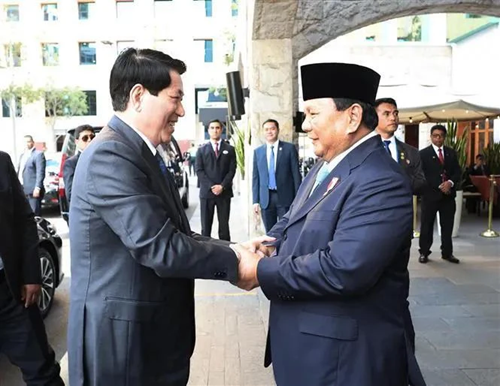The two leaders expressed satisfaction at the positive development of the traditional friendship and strategic partnership between Vietnam and Indonesia. They agreed to work together to further strengthen the bilateral relationship, making it more robust, comprehensive, and substantive.
    |
 |
|
State President Luong Cuong (left) shakes hands with Indonesian counterpart Prabowo Subianto. |
President Luong Cuong congratulated Subianto on his election as President of Indonesia, showing his belief that with his reputation and extensive experience, the Indonesian leader will lead his country to successfully achieve its policy priorities, bringing prosperity and happiness to its people, and further improve the nation’s prestige and position in the international arena.
For his part, Subianto emphasized that his country always attaches importance to its cooperation and friendship with Vietnam - its sole strategic partner within the Association of Southeast Asian Nations (ASEAN). He said he hopes to continue collaboration on measures to strengthen relations with Vietnam across areas.
Discussing future cooperation orientations, the leaders agreed to lift the bilateral relations to a new height, towards the celebration of the 70th founding anniversary of the Vietnam-Indonesia diplomatic ties, and 80 years of the National Day of both nations in 2025.
The Indonesian side agreed to expand economic cooperation, aiming to raise the two-way trade to 18 billion USD. It also pledged to facilitate access for Vietnam's agricultural, aquatic, and Halal products to the Indonesian market, and expedite negotiations for signing a rice trading agreement between the two countries.
Indonesia also acknowledged Vietnam's efforts to minimize illegal, unreported, and unregulated (IUU) fishing activities. It agreed to explore innovative measures to promote fisheries cooperation based on mutual benefit and the friendship between the two nations.
Exchanging views on regional and international issues of common concern, the two leaders agreed to maintain close coordination and to support each other at regional and international forums and organizations, including ASEAN, the U.N., the Non-Aligned Movement, and the Asia-Pacific Economic Cooperation (APEC).
Regarding the East Sea-related issues, the two sides underscored the importance of maintaining peace, stability, security, safety, and freedom of navigation and overflight in the East Sea; resolving disputes through peaceful measures; and promoting substantive and effective negotiations on a Code of Conduct (COC) in the East Sea in accordance with international law, including the U.N. Convention on the Law of the Sea (UNCLOS) in 1982.
Source: VNA